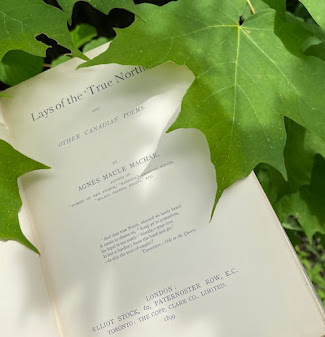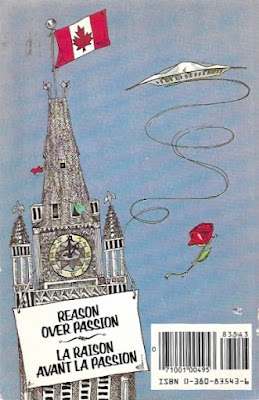Verse for the day by Agnes Maule Machar from Lays of the 'True North' and Other Canadian Poems (Toronto: Copp, Clark, 1899). No less a critic than Edwin Arnold considered Miss Machar "the first of Dominion poetesses." See if you don't agree.
CANADA'S BIRTHDAY
With feu de joie, and merry bells, and cannons' thundering peal,
And pennons fluttering on the breeze, and serried rows
of steel,
We greet once more the birthday morn of our Canadian
land,
Wide stretching from Atlantic shore to far Pacific strand,
With sweeping rivers, ocean lakes, and prairies wide and
free,
And waterfalls and forests dim, and mountains by the sea;
A country on whose birth there smiled the genius of
romance,
Above whose cradle brave hands hung the lilied flag of
France;
Whose infancy was grimly nursed in peril, pain and woe,
When gallant hearts found early graves beneath Canadian
snow;
When savage raid and ambuscade and famine's sore distress
Combined their strength in vain to crush the gallant
French noblesse;
While her dim, trackless forests lured again and yet again
From silken courts of sunny France her flower, the
brave Champlain;
And now her proud traditions guard four ancient rolls
of fame,
Crécy's and Flodden's combatants for ancestors we claim!
Past feud and battle buried far behind the peaceful years,
While Gaul and Celt and Saxon turn to pruning-hooks
their spears;
Four nations welded into one with long, historic past,
Have found in these our western wilds one common life
at last.
Through the young giant's mighty limbs that reach from
sea to sea
There runs a throb of conscious life, of waking energy;
From Nova Scotia's misty coast to far Pacific shore
She wakes, a band of scattered homes and colonies no more,
But a young nation, with her life full beating in her breast;
A noble future in her eyes, the Britain of the West.
Hers be the generous task to fill the yet untrodden plains
With fruitful, many-sided life that courses through her
veins:
The English honour, nerve and pluck, the Scotchman's
faith in right,
The grace and courtesy of France, the Irish fancy bright,
The Saxon's faithful love of home and home's affections
blest,
And chief of all, our holy faith, of all her treasures best!
May she, though poor in luxuries, wax rich in noble deeds,
Knowing that righteousness exalts the people that it leads.
As yet the waxen mould is soft, the opening page is fair;
It rests with those who rule us now to leave their impress there,
The stamp of true nobility, high honour, stainless truth,
The earnest quest of noble ends, the generous heart of
youth;
The love of country, soaring far above all party strife,
The love of culture, art and song, the crowning grace of life,
The love of science reaching far through Nature's
hidden ways,
The love and fear of Nature's God, a nation's highest praise;
So, in the long hereafter, our Canada shall be
The worthy heir of British power and British liberty,
Spreading their blessings 'neath her sway to her remotest
bounds,
While with the fame of her fair name a continent resounds,
True to the high traditions of our Britain's ancient glory
Of patriots, prophets, martyrs, saints, who live in deathless story,
Strong in their liberty and truth, to shed from shore to
shore
A light among the nations, till nations are no more!

































